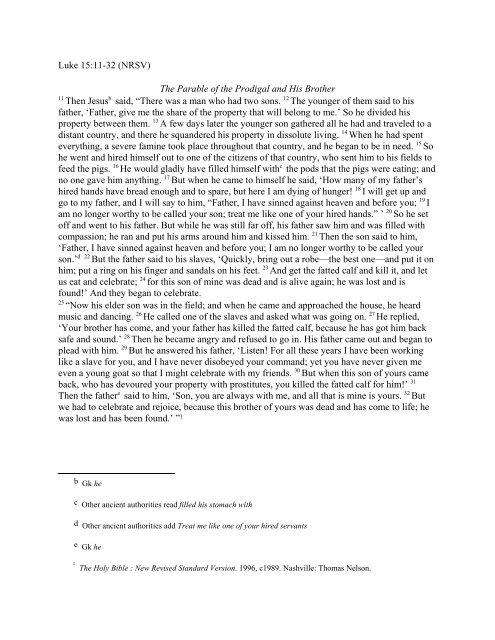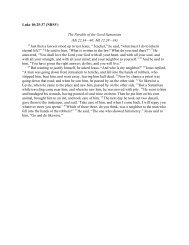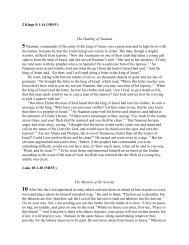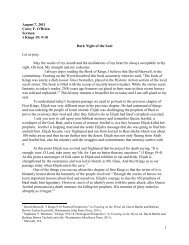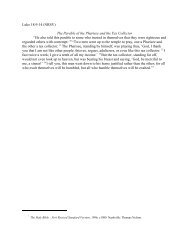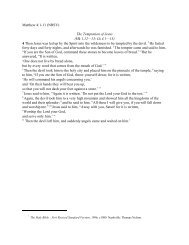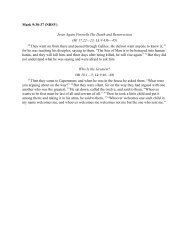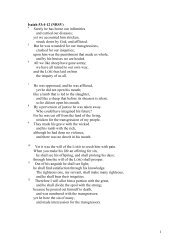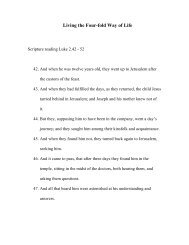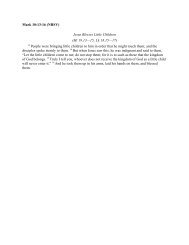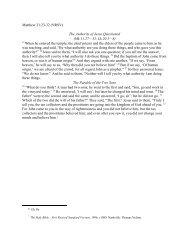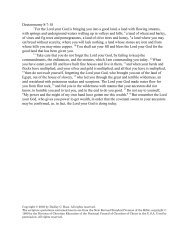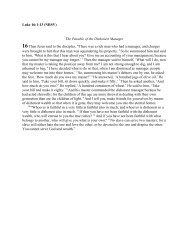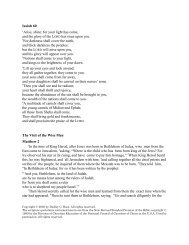Luke 15:11-32 (NRSV) The Parable of the Prodigal and His Brother ...
Luke 15:11-32 (NRSV) The Parable of the Prodigal and His Brother ...
Luke 15:11-32 (NRSV) The Parable of the Prodigal and His Brother ...
You also want an ePaper? Increase the reach of your titles
YUMPU automatically turns print PDFs into web optimized ePapers that Google loves.
ZVW - Welzheimer Zeitunghttp://www.welzheimer-zeitung.de/statisch/druck.php?artikel=1083<strong>15</strong>...1 von 2 17.02.2007 08:59Rems-Murr-RundschauDas Planspiel vom Nordost-RiesenringVon unserem Redaktionsmitglied PeterSchwarzWaiblingen. Droht dem Kreis einNordost-Riesenring von Mundelsheim über Backnang,das Wieslauftal, Winterbach und den Schurwald bisPlochingen? Tatsächlich arbeitet dasRegierungspräsidium derzeit an einerVerkehrsuntersuchung, in der solche Gedankenspieleerörtert werden.Bereits vor einem Jahr hat das Bundesverkehrsministerium dasRegierungspräsidium (RP) beauftragt, eineVerkehrsuntersuchung für den Osten von Stuttgart zuerstellen. Fernverkehr, der aus dem Norden über Heilbronnkommt, fährt bislang vor allem über die A81 westlich anStuttgart vorbei Richtung Süden, mündet beim LeonbergerKreuz auf die A8 und fließt nach Osten gen Ulm. Das RP solltenun Antwortvorschläge auf folgende Frage entwickeln: Welche<strong>and</strong>eren Wege abseits der Hauptroute könnte man demFernverkehr schaffen?Das RP ersann daraufhin neun grob vorgegebene„Planungsvarianten“ und beauftragte ein Ingenieurbüro mit derFein-Ausarbeitung.So weit ist all das nichts Neues: Bereits im März 2006 stelltedas RP in einer Pressemitteilung die Grob-Varianten vor. Undsei<strong>the</strong>r hat sich noch nichts Entscheidendes getan: „Wir sindnoch mitten drin in dieser Untersuchung“, sagtRP-Pressesprecher Frank Buth; frühestens im April sei miteinem detaillierten Abschluss-Bericht zu rechnen.Straßenbaugespenster gehen mal wieder um
Two Ways <strong>of</strong> Dying, One Way <strong>of</strong> LivingA sermon preached at North-Prospect United Church <strong>of</strong> Christ, Cambridge, MassachusettsDate: September 19, 2004Rev. Dudley C. RoseText: <strong>Luke</strong> <strong>15</strong>:<strong>11</strong>-<strong>32</strong>Among <strong>the</strong> most astonishing, even confusing <strong>of</strong> Jesus’ parables is <strong>the</strong> one we have readtoday, <strong>the</strong> story <strong>of</strong>ten called <strong>the</strong> <strong>Prodigal</strong> Son. I remember hearing this parable as a young boy inSunday School. And I remember thinking right away that I must have heard it wrong. Was mySunday School teacher really saying that Jesus told a story about a young man who took half <strong>of</strong>his fa<strong>the</strong>r’s property <strong>and</strong> squ<strong>and</strong>ered it on dissolute living, but when <strong>the</strong> young man came homebroke, his fa<strong>the</strong>r threw him a big party? Until <strong>the</strong>n I had been convinced by my parents as wellas <strong>the</strong> Sunday School that <strong>the</strong> whole point <strong>of</strong> God was to get me to do <strong>the</strong> right thing – to workhard, stay out <strong>of</strong> trouble <strong>and</strong> accomplish something in life.When I checked my mental library, I found nothing like <strong>the</strong> story <strong>of</strong> <strong>the</strong> <strong>Prodigal</strong> Son. Ifound stories that said <strong>the</strong>re was no free lunch in life. I found stories that claimed if you set yourmind on something <strong>and</strong> worked at it, you would be a success, but if you were lazy you would bea disappointing failure. I even had first h<strong>and</strong> evidence. Piano lessons. I was given warnings. Iwas told if I didn’t practice I would fail. And sure enough, <strong>the</strong>y were right. I was a miserablefailure at playing <strong>the</strong> piano. I never practiced. I wanted to chase girls <strong>and</strong> act in <strong>the</strong> school play.And my piano teacher never gave even one party to celebrate my failures <strong>and</strong> bad habits.When I heard <strong>the</strong> story <strong>of</strong> <strong>the</strong> <strong>Prodigal</strong> Son, I was pretty sure I had misheard it. But <strong>the</strong>nI read it for myself. And sure enough, <strong>the</strong> story went just as <strong>the</strong> Sunday School teacher said itdid. I asked my teacher, Is this thing for real? And she assured me that it most certainly was.She said, God is just like <strong>the</strong> fa<strong>the</strong>r in that story. Isn’t that wonderful?I was pretty sure this story was a big secret. At least I was pretty sure that my pianoteacher <strong>and</strong> my parents had never heard it before. That day was one <strong>of</strong> <strong>the</strong> few times I recall thatI was eager to rush home <strong>and</strong> tell my fa<strong>the</strong>r what I’d learned in Sunday School. Needless to say,he wasn’t as excited about it as I was. He said, Don’t <strong>the</strong>y teach you <strong>the</strong> Ten Comm<strong>and</strong>mentsanymore? That’s what you should learn in Sunday School. You should learn all those placeswhere it says, Thou shalt not. Thou shalt not, now that’s when God is really talking.I must confess, even as I grew older, I found <strong>the</strong> story <strong>of</strong> <strong>the</strong> <strong>Prodigal</strong> Son perplexing.Even in Divinity School. I once took a class about leading Bible studies. In a memorable sessionwe were required to act out <strong>the</strong> parable <strong>of</strong> <strong>the</strong> prodigal son. Each member <strong>of</strong> <strong>the</strong> class was givena part to play. And since <strong>the</strong>re were more people than <strong>the</strong>re were important parts in <strong>the</strong> story, <strong>the</strong>story got embellished, too. As I recall, <strong>the</strong> prodigal son even brought home one <strong>of</strong> <strong>the</strong> harlots in<strong>the</strong> story. Evidently, both <strong>the</strong> prodigal <strong>and</strong> <strong>the</strong> harlot had repented. <strong>The</strong> class, all aspiringministers, had more than a few hams in it, as well. So <strong>the</strong> party thrown by <strong>the</strong> fa<strong>the</strong>r became ara<strong>the</strong>r loud <strong>and</strong> raucous affair. Wine <strong>and</strong> food were aplenty; song <strong>and</strong> loud laughter ruled. <strong>The</strong>party was a carnival <strong>of</strong> gluttony <strong>and</strong> hedonism.<strong>The</strong>n, <strong>of</strong> course, <strong>the</strong> party pooper showed up. <strong>The</strong> most humorless aspiring minister in <strong>the</strong>class was given <strong>the</strong> role <strong>of</strong> <strong>the</strong> elder bro<strong>the</strong>r. Scowling, sulking, lower lip stuck out, he whined1
that it wasn’t fair. He threw his arms around in disgust. He sputtered his words. After all, he hadbeen <strong>the</strong> one who had done what he was supposed to, <strong>and</strong> he got no such party. But his youngerbro<strong>the</strong>r, who had squ<strong>and</strong>ered a fortune, got a banquet. He had even brought one <strong>of</strong> his ‘women’with him, <strong>and</strong> she was sitting at <strong>the</strong> household table, too, celebrating like a queen. Had everyonegone crazy, he wondered aloud? Had everyone lost <strong>the</strong>ir mind? What had happened to commondecency? And why was he left to work in <strong>the</strong> field while debauchery was rewarded with a feast.<strong>The</strong> tirade had <strong>the</strong> intended effect. It took <strong>the</strong> wind out <strong>of</strong> everyone’s sails, <strong>and</strong> decidedlytook <strong>the</strong> fun out <strong>of</strong> <strong>the</strong> party. And this is exactly <strong>the</strong> place that Jesus leaves us in <strong>the</strong> parableitself. We are left with a bitter older son who has pointed out how responsible he has been, howirresponsible his bro<strong>the</strong>r has been, <strong>and</strong> how unfair it is that <strong>the</strong> younger bro<strong>the</strong>r gets a party. Andif <strong>the</strong> truth be known, most <strong>of</strong> Jesus’ followers probably sided with <strong>the</strong> older bro<strong>the</strong>r, <strong>and</strong> myguess is that most <strong>of</strong> us do, too.And so <strong>the</strong> story, perhaps, leaves us thinking that Jesus’ generosity doesn’t pay enoughattention to who deserves what, that in his rush to show <strong>the</strong> generosity <strong>of</strong> God’s love, he hasoverlooked <strong>the</strong> stalwart son. He has taken <strong>the</strong> older son for granted.But. With Jesus <strong>the</strong>re’s always a but. Jesus’ parables grab our attention. Sometimes,very <strong>of</strong>ten, <strong>the</strong>y irritate us, just like <strong>the</strong>y irritated those he told <strong>the</strong>m to <strong>the</strong> first time. And <strong>the</strong>n,<strong>the</strong> but comes in. Jesus is always saying, But take a closer look. He’s always saying, But youhaven’t seen <strong>the</strong> whole story yet.This morning when we take a closer look at this story, we find some surprisingrevelations. Let’s look at <strong>the</strong> very beginning <strong>of</strong> <strong>the</strong> story. <strong>The</strong> beginning is easy to pass over. Itseems merely to be setting <strong>the</strong> scene. <strong>The</strong> younger bro<strong>the</strong>r asks for his inheritance early.Surprisingly <strong>the</strong> fa<strong>the</strong>r grants his wish, right? Well, almost right. <strong>The</strong> fa<strong>the</strong>r actually divides <strong>the</strong>property between <strong>the</strong> two boys. <strong>The</strong> fa<strong>the</strong>r, still a young man as far as we can tell, h<strong>and</strong>s overhis property long before his death, <strong>and</strong> not just to <strong>the</strong> younger son, but to <strong>the</strong> older son, too. <strong>The</strong>fa<strong>the</strong>r divides his property between <strong>the</strong>m.But it’s even more interesting than that. For <strong>the</strong> Greek behind <strong>the</strong> English translation isfilled with more meaning than <strong>the</strong> English conveys. <strong>The</strong> Greek word ousia in <strong>15</strong>:12, 13 (<strong>and</strong>nowhere else in <strong>the</strong> entire New Testament) <strong>and</strong> <strong>the</strong> Greek word bios in <strong>15</strong>:12, 30. In <strong>the</strong> <strong>NRSV</strong><strong>the</strong> four instances <strong>of</strong> <strong>the</strong>se two words are all translated as "property." But ousia was already atechnical term in Greek philosophy for Being; it also has <strong>the</strong> connotation <strong>of</strong> substance orexistence. And bios is <strong>the</strong> st<strong>and</strong>ard word for life. So a more literal rendering <strong>of</strong> <strong>Luke</strong> <strong>15</strong>:12-13would be: 2“<strong>The</strong> younger <strong>of</strong> <strong>the</strong>m said to his fa<strong>the</strong>r, 'Fa<strong>the</strong>r, give me <strong>the</strong> share <strong>of</strong> [your] existencethat will belong to me.' So he divided his life between <strong>the</strong>m. A few days later <strong>the</strong> younger songa<strong>the</strong>red all he had <strong>and</strong> traveled to a distant country, <strong>and</strong> <strong>the</strong>re he squ<strong>and</strong>ered his existence indissolute living.”<strong>The</strong> fa<strong>the</strong>r prematurely divides his very existence between his two sons. In a real sense,<strong>the</strong> sons ask to have <strong>the</strong>ir fa<strong>the</strong>r’s life. And <strong>the</strong> fa<strong>the</strong>r unflinchingly gives up his life to <strong>the</strong>m.<strong>The</strong> parable wants to suggest that <strong>the</strong> two sons essentially took <strong>the</strong>ir fa<strong>the</strong>r’s life. It’s beginningto sound a lot like Good Friday, isn’t it?And so from <strong>the</strong> very beginning <strong>the</strong> older son is not as clean as he looks. <strong>The</strong> younger2 See: http://home.earthlink.net/~paulnue/year_c/lent4c.htm2
son’s sins are obvious. <strong>The</strong> younger son is blatant in asking for his fa<strong>the</strong>r’s being. <strong>The</strong> youngerson’s dissolute living leaves no room for misunderst<strong>and</strong>ing. He has squ<strong>and</strong>ered, wastedeverything. He has broken a number <strong>of</strong> obvious comm<strong>and</strong>ments along <strong>the</strong> way.But <strong>the</strong> older son is more subtle. <strong>His</strong> sins are more sins <strong>of</strong> omission. When <strong>the</strong> property,or better his fa<strong>the</strong>r’s very being <strong>and</strong> life, is to be divided, he raises no objection. He simply takeshis half without comment. Indeed, <strong>the</strong> older son in all likelihood believes that he is getting onlywhat he deserves. And <strong>the</strong>n <strong>the</strong> older son stays home. He tends <strong>the</strong> crops <strong>and</strong> works <strong>the</strong> fields.He is responsible. He makes <strong>the</strong> farm produce. And all along <strong>the</strong> way he is proud <strong>of</strong> himself forwhat he has accomplished. He looks out over <strong>the</strong> expanse <strong>of</strong> his inheritance <strong>and</strong> congratulateshimself on how good a job he has don. He pats himself on <strong>the</strong> back saying, Look what I haveachieved!From <strong>the</strong> very beginning both sons head down problematic paths. Both <strong>of</strong> <strong>the</strong>m startfrom <strong>the</strong> same beginning point: I deserve my inheritance from my fa<strong>the</strong>r. This is <strong>the</strong> screw thatJesus wants to turn down. Both sons in a very real way believe <strong>the</strong>y deserve what is not <strong>the</strong>irs,<strong>and</strong> both <strong>of</strong> <strong>the</strong>m are perfectly happy to take it.This brings us to <strong>the</strong> core <strong>of</strong> <strong>the</strong> parable. Jesus addressed this parable to <strong>the</strong> religiousleaders <strong>and</strong> upst<strong>and</strong>ing citizens <strong>of</strong> his day. And <strong>the</strong>y were a lot like <strong>the</strong> older son. <strong>The</strong>y had acertain level <strong>of</strong> status. <strong>The</strong>y lived upright lives. And most <strong>of</strong> all <strong>the</strong>y could not see <strong>the</strong>ir selfrighteousnessfor what it was. <strong>The</strong>y could see <strong>the</strong> sins <strong>of</strong> those who were like <strong>the</strong> younger son,<strong>the</strong> flagrant sinner. <strong>The</strong>y could point <strong>the</strong>ir fingers at <strong>the</strong>m. And <strong>the</strong>y could say <strong>the</strong>y deservenothing, for <strong>the</strong>y are bad. But we, we who have been blameless <strong>and</strong> conscientious, mostcertainly we deserve everything that we have, everything that we have accomplished by our ownh<strong>and</strong>s.In <strong>the</strong> end, we have two sons who wanted to have life, who believed <strong>the</strong>y deserved life<strong>and</strong> dem<strong>and</strong>ed life <strong>of</strong> <strong>the</strong>ir fa<strong>the</strong>r. Each took his inheritance <strong>and</strong> went his own way. Each had astrategy for life. <strong>The</strong>y are <strong>the</strong> same strategies open to us. Paul Nuechterlein says it well:One is <strong>the</strong> prodigal son's strategy: take <strong>the</strong> blessing <strong>of</strong> life from <strong>the</strong> fa<strong>the</strong>r <strong>and</strong> spend it ononeself. It is <strong>the</strong> "eat, drink, <strong>and</strong> be merry" approach to trying to “live”. Unfortunately, itactually leads to death, instead, because it cuts itself <strong>of</strong>f from <strong>the</strong> true source <strong>of</strong> life.<strong>The</strong> older son has ano<strong>the</strong>r strategy: take <strong>the</strong> blessing <strong>of</strong> life from <strong>the</strong> fa<strong>the</strong>r for granted<strong>and</strong> hoard it for oneself. <strong>The</strong>re is great irony here, for <strong>the</strong> older son accuses his fa<strong>the</strong>r <strong>of</strong> takinghim for granted, when it is really <strong>the</strong> o<strong>the</strong>r way around. This strategy, this strategy <strong>of</strong> taking itfor granted <strong>and</strong> hoarding it, comes with a much higher quotient <strong>of</strong> self-delusion, <strong>and</strong> <strong>the</strong>refore itis so is much harder to see, so much harder to grasp how deadly it is. One can always point <strong>the</strong>finger <strong>of</strong> accusation at those prodigal bro<strong>the</strong>rs <strong>and</strong> sisters who waste <strong>the</strong>ir lives <strong>and</strong> so obviouslyfind <strong>the</strong>mselves broken <strong>and</strong> dead. <strong>The</strong> older sons, <strong>the</strong> taking it for granted <strong>and</strong> hoarding itpeople, avoid <strong>the</strong>ir own brokenness <strong>and</strong> death by pointing <strong>the</strong> finger at o<strong>the</strong>rs. Jesus says that<strong>the</strong>se people who st<strong>and</strong> outside <strong>the</strong> party, filled with resentment, are more likely to staydisconnected from <strong>the</strong>ir source <strong>of</strong> life, <strong>and</strong> are more likely to be you <strong>and</strong> me. 3It is easier for <strong>the</strong> older bro<strong>the</strong>r to remain self-deluded, <strong>and</strong> so in some sense Jesus raisesa greater question about whe<strong>the</strong>r <strong>the</strong>y will come to appreciate <strong>the</strong> full abundance <strong>of</strong> grace, <strong>the</strong>full abundance that <strong>the</strong>y don’t deserve but which God wants ever so desperately to give <strong>the</strong>m.3 Ibid3
<strong>The</strong> younger son is ultimately brought so low that he cannot mistake <strong>the</strong> path he has chosen for<strong>the</strong> path <strong>of</strong> life. He comes home repentant <strong>and</strong> undeluded about his life. But <strong>the</strong> parable endswith a question mark about <strong>the</strong> older bro<strong>the</strong>r. <strong>His</strong> fa<strong>the</strong>r says to him. “Son, you are always withme, <strong>and</strong> all that is mine is yours. But we had to celebrate <strong>and</strong> rejoice, because this bro<strong>the</strong>r <strong>of</strong>yours was dead <strong>and</strong> has come to life; he was lost <strong>and</strong> has been found.” We are not told how <strong>the</strong>older son finally responded. He st<strong>and</strong>s as a question <strong>and</strong> a challenge for all <strong>of</strong> us. Does he cometo grasp, <strong>and</strong> will we come to grasp, that our true life is found not in what we think we deserve<strong>and</strong> accomplish, but in a God who says, “All that is mine is yours”? We can be sure that if wedo, <strong>the</strong> party streamers will fly, <strong>and</strong> <strong>the</strong>re will be a feat <strong>of</strong> gr<strong>and</strong> proportions. For our God willbe glad to welcome us home, to welcome us to true life. Amen.Copyright © 2004 by Dudley C. Rose. All rights reserved.4


